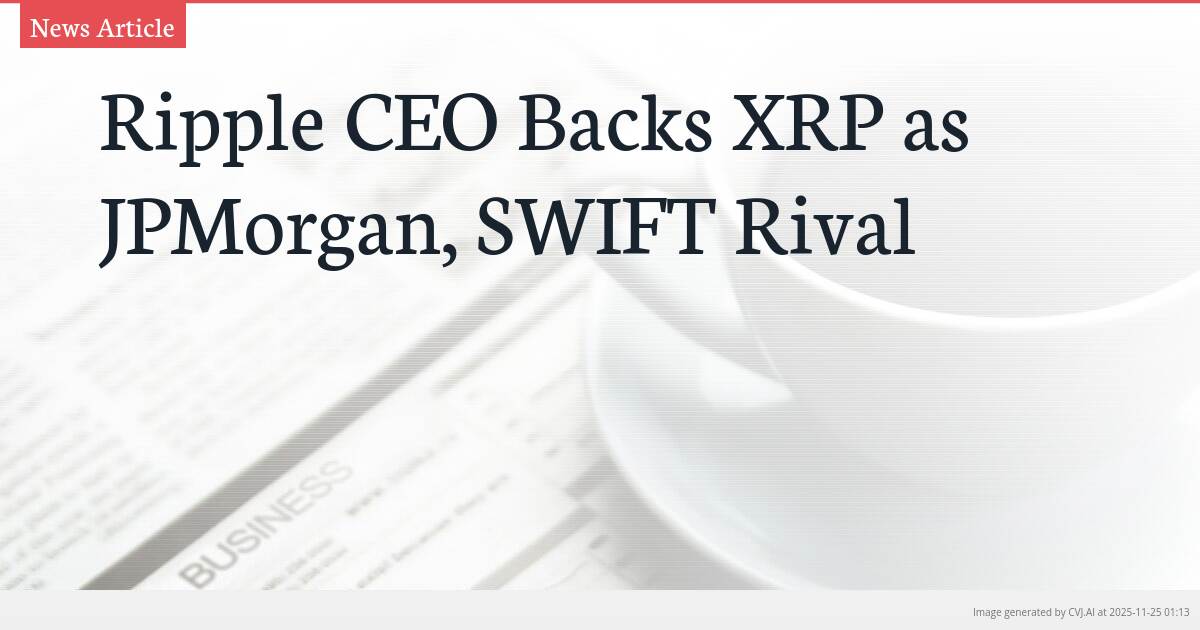Introduction
Teucrium Trading CEO Sal Gilbertie has positioned Ripple as a formidable competitor to banking giants JPMorgan Chase and global payment network SWIFT. He emphasized that Ripple’s potential banking license would enable it to operate with the capitalization and discipline of top-tier financial institutions. This endorsement signals growing institutional recognition for XRP’s role in transforming cross-border payments.
Key Points
- Ripple is seeking a US national banking charter from the OCC, which would make it one of the first crypto-native companies to obtain such a license
- Gilbertie described XRP as a strategic asset that Ripple intends to hold long-term, with value expected to appreciate through ecosystem utility rather than being sold
- The endorsement comes as institutional infrastructure aligns with ISO 20022 standards implementation and increasing XRP ETF inflows
Institutional Validation for Crypto's Banking Ambitions
Sal Gilbertie, CEO of Teucrium Trading, has delivered a striking institutional endorsement of Ripple, describing the crypto payments company as building a “fully operational financial institution” capable of rivaling traditional banking giant JPMorgan Chase. In an interview with Paul Barron, founder of the Paul Barron Network, Gilbertie positioned Ripple as a highly interconnected ecosystem that could achieve global scale once it obtains a banking license. This perspective from a regulated TradFi CEO represents rare institutional recognition that moves beyond typical crypto industry speculation.
Gilbertie stressed that with a banking charter, Ripple would operate with the capitalization and operational discipline associated with top-tier banks. The company has been actively seeking a US national banking charter from the Office of the Comptroller of the Currency to establish a new national trust bank. If authorized, Ripple would become one of the first crypto-native companies to obtain a US national bank license, marking a significant milestone in the convergence of traditional finance and digital assets.
XRP as Strategic Asset in Banking Transformation
At the heart of Ripple’s growing banking ecosystem lies XRP, which Gilbertie described as a strategic asset that Ripple has no intention of selling. The Teucrium Trading CEO emphasized that XRP’s value is intended to appreciate over time through its utility across the XRPL ecosystem, rather than through speculative trading. This long-term holding strategy underscores Ripple’s commitment to building sustainable value through real-world use cases.
Gilbertie characterized Ripple as a “machine” that operates in a disciplined, coordinated manner, with its team growing and innovating while maintaining network strength and connectivity. He boldly claimed that Ripple is “at the center of the universe,” highlighting its pivotal role in potentially reshaping the global banking landscape. This description suggests Ripple’s approach combines technological innovation with the operational rigor expected of established financial institutions.
Competitive Positioning Against Legacy Systems
Ripple’s emergence as a potential competitor extends beyond JPMorgan Chase to include SWIFT, the global messaging network for cross-border payments. Gilbertie’s endorsement positions Ripple as a faster and more efficient alternative to SWIFT, particularly in the realm of international money transfers. This dual competitive stance against both a banking giant and a global payments network demonstrates the breadth of Ripple’s ambitions in the financial services sector.
The timing of Gilbertie’s validation coincides with significant industry developments, including the upcoming full enforcement of ISO 20022 standards and rising XRP ETF inflows. As noted by XRP advocate Diana, who shared the interview, infrastructure, compliance, and institutional interest appear to be aligning simultaneously. She emphasized that price movements typically follow institutional and infrastructure development, suggesting XRP may be positioned for substantial growth once these foundational elements are fully established.
Market Implications and Community Response
The interview between Gilbertie and Barron generated strong, supportive reactions from the crypto community, with many interpreting the Teucrium Trading CEO’s statements as validation of XRP’s evolving role in institutional finance. Observers noted that hearing a regulated traditional finance CEO describe Ripple as a JPMorgan rival provides credibility that extends beyond typical crypto industry commentary.
This institutional endorsement comes at a critical juncture for digital assets, as regulatory clarity and traditional finance integration become increasingly important for mainstream adoption. Gilbertie’s perspective suggests that Ripple’s approach—combining blockchain technology with banking discipline—may represent a viable path forward for crypto companies seeking to compete with established financial institutions while navigating regulatory requirements.
📎 Source reference: newsbtc.com

